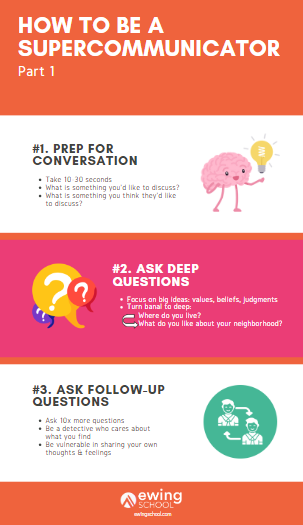How to be a Supercommunicator (Part 1)
Charles Duhigg’s new book explores the art of connecting with people.
“Every meaningful conversation is made up of countless small choices.”
~ Charles Duhigg
On Wednesday I took a mid-afternoon work break to walk our dog Ollie and his buddy Birdie. We’re watching Birdie for the week, and having them together gives me an excuse to unplug and head down to the river and play.
We saw a friend of mine, Haley, who was out walking her dog. She asked about Maryrose, my past weekend, and my upcoming plans. We chatted for several minutes.
As we parted, Haley mentioned that she had just found out she secured a coveted spot in our local Search and Rescue group. I knew she’d been working hard to do this for more than a year. I congratulated her and went on my way.
Reflecting on the conversation later, I cringed realizing that I never asked Haley any questions. I just talked at her. She was brimming with joy and pride, excited to share her good news, and I was oblivious, choosing instead to ramble about myself.
I’m not alone in doing this. Our default is to find ways to shift conversations onto ourselves. Charles Duhigg explains that he wrote his new book, Supercommunicators, in part to address his own communication failures.
Duhigg is a Pulitizer-winning author known for diving deep into subjects and teaching his readers how to apply what he learns. You may know him from his uber-classic The Power of Habit.
In Supercommunicators, the shortest and easiest-to-read of his books, Duhigg explains that communication is a skill. Nearly anyone can master it, but this is not easy. The more guidance we have, the more likely we are to succeed.
Supercommunicators offers us that guidance.
The thesis is that quality conversations build quality relationships. We’ve discussed how the most important key to a fulfilling life is our relationships with other people. The better our connections with others, the better our lives.
“Ultimately, the bond of all companionship, whether in marriage or in friendship, is conversation.”
~ Oscar Wilde
Duhigg teaches how we can deepen our relationships by improving our conversational skills. His book is information-dense and covers a lot of ground, so I’m focusing today on his three core steps to a conversation.
He says that “supercommunicators” are the people who apply these three steps so well that they can deeply connect with nearly anybody.
#1: Prep for Conversation
The iconic American orator Daniel Webster said he’d rather give a speech half-dressed than half-prepared. Most of us would likely agree with him when it comes to keynote speeches, Congressional testimonies, and court arguments.
But how many of us prepare for our everyday conversations?
Duhigg recommends you take 30 seconds before your conversations and jot down a few potential topics to discuss. This can be as simple as asking what your friend did over the weekend, what plans they have coming up, what books they’ve recently read, etc.
If you know about their life and their interests, even better. Perhaps they told you how excited they are about Netflix releasing The Three Body Problem, or they tried to get you to read Sapolsky’s book Determined, or they recently returned from a vacation in Peru.
The more we tailor our conversation to our specific audience, the more likely we are to build a meaningful connection.
Having a few topics ready to go will boost your confidence, lower your anxiety, and reduce awkward pauses or lulls – even if you don’t end up discussing any of the topics you wrote down. Simply doing the quick prep will improve your conversation skills.
To prep for conversations, ask yourself:
What are a couple of topics I would like to discuss?
What are a couple of topics my friend would like to discuss?
What is the one thing I would most like to say?
#2: Ask Deep Questions
Eleanor Roosevelt supposedly said that small minds discuss people, average minds discuss events, and great minds discuss ideas.
The same can be said for conversations. The great ones discuss ideas, especially regarding values, beliefs, and judgments. Tossing in a few “deep” questions to draw out ideas will help to deepen the connection between you and your conversational partner.
Deep Values Questions:
Why did you decide to become an entrepreneur?
How important is it for communities to foster innovation?
What role should the government play in advancing science and technology?
Deep Beliefs Questions:
Do you think we all have a purpose in life?
Should there be a separation between money and state?
What role do you think curiosity and wonder play in a fulfilling life?
Deep Judgment Questions:
What have you changed your mind about?
Do you think AI will make the world better for our children?
What would you do differently if you had to start your business all over again?
Asking deep questions can become a regular part of your routine. Professor Nicolas Epley from the Booth School in Chicago studies deep questions. Riding the train to work he’ll ask strangers a series of connected deep questions:
What do you do for a living?
Do you love that job?
Do you have something else you dream of doing?
And in just a moment he’s discussing their lives, loves, and dreams. With a quick tweak, Duhigg shows how we can turn almost any common question into a deep question:
Where do you live? → What do you like about your neighborhood?
Where did you go to school? → What was an unforgettable experience from school?
What’s a recent book you read? → What’s a book that changed the way you live?
Deep questions can get our conversational partners to open up and share their values, beliefs, judgments, and personal experiences, leading to powerful bonding and appreciation moments.
#3. Ask Follow-up Questions
What do we do after asking a deep question? We can ask more questions!
A team of researchers at Harvard found it’s not just deep questions that foster connection, it’s making our conversational partner feel seen and understood at a deep level. Asking follow-up questions to their answers shows that you are listening and want to know more.
This also gives you an opportunity to share your ideas and experiences. After asking a follow-up question, if your conversational partner doesn’t ask you a question, answer your own.
You could ask: What’s a book that changed how you live? And then follow up their answer with: How would you be different today if you hadn’t read the book? Then you could share your answer: For me, the book would be Siddharta….
Ideally, you pay attention to how open and vulnerable your conversational partner is and match their levels. You can bond over values, beliefs, judgments, and experiences, even if you come from different worlds or ideologies.
As Duhigg says:
[M]astering each step can help you become what I call a supercommunicator — someone who can get through to almost anyone, figuring out how to connect in even the most unlikely circumstances. More importantly, it can help you build lasting connections.
In a follow-up piece, we’ll explore how most conversations are actually three different types of conversations melded together and how we can effectively identify and navigate them.




